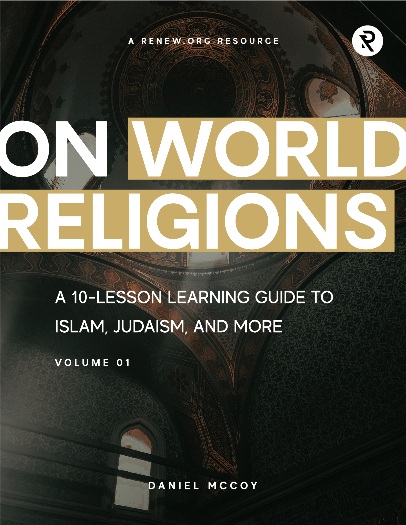
Why Is There Anti-Semitism…Then and Now? Q&A with Matthew Umbarger
Why is there anti-Semitism throughout history and even in our own times? Matthew Umbarger is a Catholic scholar who spent nine years studying the Old Testament in Israel (PhD in Hebrew Bible from Ben-Gurion University of the Negev). He has long had a heart for understanding and loving the Jewish people. I recently caught up with Matt and asked him to help me understand the pervasiveness and persistence of anti-Semitism.
Q: When did you first learn of anti-Semitism?
Growing up in small-town America, I grew up hearing people say things that enforced stereotypes that weren’t kind to Jews. So, for example, in drivers’ ed, our teacher would tell us we never want to settle for sticker price, but that we should “jew down” the salesman. I doubt he was being malicious; I think he was just using expressions.
I didn’t personally know a Jewish person until I went to college. At college, we visited the Jewish temple, and that got me interested in learning more. My parents had told me about World War II and the Holocaust, so I was already aware of some of the history, but actually meeting Jewish people, visiting the temple, etc. were first steps toward diving into the history and learning all I could. During this season, a lot of books talking about Christian anti-Semitism fell into my hands. Even though some of the books were a bit suspect, that’s when I became aware of Christian anti-Semitism.
Q: How did you decide to become a missionary in Israel?
I remember being perplexed as to why today more Jewish people don’t accept Jesus (although the phenomena of Christian anti-Semitism helped make some sense of this). While still in college, I became interested in exploring messianic Judaism.
One time, while reading Romans 9-11, I felt my heart really being gripped. In these chapters, Paul is wrestling with the same question: Why don’t more Jews come to Jesus? Those chapters convinced me to become one of the Gentiles through whom the Jewish people would be envious and come to Jesus (Rom. 11:14). That’s why we became missionaries to Jewish people in Israel.
Q: What did you learn about Christian anti-Semitism?
I started reading all kinds of Jewish history, both Christian materials (by messianic Jews) and secular Jewish material. Around that time, I read Chaim Potok’s The Wanderings, a magnificent biography of the Jewish people. I read that, and, over and over again, I was struck by the scandal of Christian anti-Semitism. The Spanish Inquisition, Blood libel, expulsion of Jews from England, pogroms in Eastern Europe, the book burnings. Rounding Jews into a synagogue during the First Crusade and burning it to the ground.
This really distressed me. And for a long while, I adopted a narrative that the Jewish people have not come to Christ because of the poor job that we have done showing the face of Christ to the Jewish people. Another thing I used to say when we first got to Israel was to respond that the anti-Semitic “Christians” weren’t really Christian; they were Catholic. (That’s before I myself converted to Catholicism.) But we need to acknowledge that there have been awful sins that Christians have committed throughout history.
“We need to acknowledge that there have been awful sins that Christians have committed throughout history.”
As Christians, we’re part of the body, and the sins in the rest of the body affect us too, so we have the duty to make things right if we can. I believe that part of the way redemption works is communal. So, even though I have not personally participated in these sins, they still affect me because the Body of Christ into which I am incorporated perpetrated these sins. I suffer their effects, as do the progeny of our victims. So, justice demands something more than just saying, “I’ve never personally expelled a Jew from his or her home, or participated in a pogrom, or disseminated anti-Semitic literature, so I’m good. Let’s just be friends.” And many of my Jewish friends won’t let me get away with that kind of attitude, either. The only thing that I know of that can move this relationship between Jews and Christians forward is “identificational repentance,” similar to what we see in the prayers of repentance by Nehemiah and Daniel. It is difficult, but transformative and worth it.
Q: Why have Jews been the target of so much discrimination and hate throughout history? Why is there anti-Semitism?
I think there are two things you have to look at. First, anything that leaves out the spiritual world is missing the biggest part of all this. The short answer is that Satan hates the Jewish people. Jesus came from the Jewish people. The Jewish people gave us the prophets, the Scriptures, the doctrine of the resurrection, God as Creator, and divine revelation.
In the Book of Daniel, we have these episodes when the veil is pulled aside, and we see the struggle between Michael and Gabriel with the Prince of Persia, who is trying to keep the angel from coming and ministering to Israel (specifically Daniel). The Jews have long been a special target of satanic hatred. Satan loves to divide and scatter, so one of the things he has done is sow deep division and hatred between Jewish people and Christians, the two descendants of Abraham, physical and spiritual.
And the second thing you have to consider are all kinds of historical reasons—some of which seem random, others which seem almost purposeful.
Q: Where does it start?
Some of it seems to start in the law of Moses itself. In Leviticus 11, you get the menagerie of animals Israelites are not supposed to eat. On the one hand, there are things none of us are tempted to eat, like bats. But then there are things forbidden that are quite tasty: swine and shrimp, for example. If you get to the end of this passage, it says you won’t eat this so you will be holy, a word meaning cut off, separate in Hebrew.
“God didn’t want them syncretizing their covenant faith with the faith of the Canaanites.”
And that’s the basis of a lot of the strange laws. Among the purposes of the purity laws is to keep them weird, different. God didn’t want them syncretizing their covenant faith with the faith of the Canaanites. The way you cut a covenant in the ancient world was sacrificing an animal and eating it. So the food law worked. It kept Israel apart. The upshot is that everyone who came into contact couldn’t understand them: fringes on garments? Won’t eat pork?
Q: How did that difficulty in fitting in disadvantage them when they were conquered by empires?
The Northern tribes are conquered by Assyria, and the Southern ones are conquered by Babylon and Persia. But it’s not until we get to the Greek kingdom of the Seleucids that they begin to experience something that feels like genocide. After Alexander the Great dies and his empire is divided into quarters, the quarter known as the Seleucid Empire, under Antiochus Epiphanes, moves to persecute their Jewishness out of them. The Seleucids see the Jews as strange. They don’t observe the laws. So, there’s a motive to eradicating them because they’re not seen as good citizens. Now, when it comes to Antiochus Epiphanes, the motive isn’t necessarily ethnic, because if Jews sacrifice to an idol, they’re off the hook. So, it’s not ethnic genocide yet.
The Jewish family known as the Maccabees revolted against the Seleucids and won independence, but around a hundred years later, the Jews were again brought under the thumb of an empire: Rome. We get a helpful snapshot of Roman anti-Semitism in Josephus’s Against Apion. Apion was an Egyptian from Alexandria who had written a lot of anti-Semitic screed against the Jewish people. One of the charges Apion makes is that they are weird, dangerous, not like us. So, we don’t want Jewish people around us.
Why is there anti-Semitism? “Making fun of Jews even shows up in Roman poetry, even in the second century.”
Making fun of Jews even shows up in Roman poetry, even in the second century. They are caricaturized by the Romans as peddlers and merchants with strange food. The Roman historian Tacitus in his Annals admires them in a strange way; to him, they are an exemplar of free peoples because they don’t want to come under the rule of the emperor. Yet Tacitus still portrays them as weirdos. They’re described as aliens, strange, suspicious. You can’t trust them; if there’s a revolution in the area, they will side with the enemy.
And when the first Jewish-Roman war (AD 66-73) started, people all over the world turned on the Jewish people. There were pogroms. Part of the reason the war started in the first place was that Rome wasn’t protecting Jewish people. In northern Galilee, there were all kinds of pogroms even before AD 70. The first Jewish-Roman War ended with the Jews’ second temple destroyed and hundreds of thousands of Jews killed. Between AD 132-136, a second revolt against Rome (the Bar Kokhba revolt) ended with hundreds of thousands more killed, the expulsion of Jews from Jerusalem, and the names of Judea and Ancient Israel replaced with “Syria Palaestina.” The Roman emperor had sacred scrolls of Judaism publicly burned on the temple mount.
Q: And then came Christian anti-Semitism.
It’s important to note that anti-Semitism didn’t emerge from within Christianity. But in Europe during the Christian era, anti-Semitism persisted and took on a theological coating. Just a few of the low points: Intermarriage between Jews and Christians forbidden (AD 339). Conversions of non-Jews to Judaism forbidden (AD 415). Jews in Byzantine Empire forced to convert to Christianity (AD 722). Entire Jewish communities devastated during the crusades (beginning in AD 1096). The expulsion of Jews from England (AD 1290). Jewish communities destroyed on suspicion of being behind the Black Death (AD 1348-9). The expulsion of Jews from Spain (AD 1492).
I’ll mention an interesting accident of history which led to an awful outcome for Jews. During the Middle Ages, the Catholic Church forbade Catholics from lending money to another Catholic at interest (usury). Jewish law also forbade Jews to lend money to another Jew. So, Jewish people, already unable by law to own land, needed a way to survive economically. So, it made sense for them to become money lenders. This led to them getting a corner on the market on the banking business. None of us really like the people we owe money to very much. So, it’s likely that the reason they were expelled from England had to do with not wanting to pay the money that was due them as moneylenders. The trope presenting Jews as greedy has lasted for centuries (e.g., Shakespeare’s Merchant of Venice).
Why is there anti-Semitism? “The trope presenting Jews as greedy has lasted for centuries.”
The expulsion from Spain was more complicated. Ferdinand and Isabella conquered Spain from the Muslims, and back then, Jewish people felt more secure living among Muslims. They had to pay Muslims the jizya tax, but many still prospered under Muslim rule. And the language of medieval Jewry was Arabic. When Ferdinand and Isabella see Arabic-speaking people living in traditionally Muslim areas, they become suspicious. First comes the Spanish Inquisition, then the expulsion of Jews from Spain altogether. A lot of Sephardic Jews (from Spain) settled in Turkey and North Africa.
Meanwhile, Ashkenazi Jews (from Central and Eastern Europe) tended to move further east into Eastern Europe. Further east, their existence was still precarious, as, for example, it became tradition on Good Friday or Easter to pay the Jews back for Jesus’ death by pogroms. Sometimes a Good Friday service would whip the crowd into a lather and they would go and burn down the local synagogue. And Jews weren’t blamed just for what happened to Jews; often they were falsely accused and killed for causing plagues, for using the blood of Christian children to perform rituals (the “blood libel”), and for “host desecration,” intentionally mistreating the consecrated host (communion bread) while staging a sacrilegious Mass.
Q: And the modern world didn’t automatically become more tolerant toward Jews, did it?
Even when forms of Judaism adapted and secularized (e.g., Reform Judaism), anti-Semitism throughout Europe continued, fueled by propaganda. Anti-Semitic newspapers popped up all throughout Europe. The play “Protocols of the Elders of Zion” portrayed Jews taking over the world and this idea became a popular conspiracy theory.
By the end of the 19th century, many were trying to find scientific bases for all these prejudices. They came up with some strange genetic theories. All the while, theologians began suggesting that Jesus wasn’t really Jewish. You also see occultic ways of thinking (e.g., in the Theosophical Society) which posit that Jews are holding us back from our spiritual evolution.
Why is there anti-Semitism? “The ingredient through all of this is nationalism, the same impulse that ended up causing World War II.”
The ingredient through all of this is nationalism, the same impulse that ended up causing World War II. The idea is that France is for French people. Anyone not French doesn’t have any business living in France. Anyone in government and military needs to be French. Same with Germany, same with all the countries in Europe. The Jewish people continued to be a people without a home, caught in the middle, always an object of suspicion.
This led Theodor Herzl, 19th century Jewish Austrian, to propose a solution to all of this: give Jews their own nation. He suggested Palestine. Of course, others proposed their own solution, such as the Third Reich’s “Final Solution” which opted for extermination instead of just more of the same episodes of expulsion.
Q: And anti-Semitism continues—even after the Holocaust?
I’ve met Jewish people who were asked to remove their hats so the questioner could see their horns. The mythology is that when the Jewish people crucified Jesus (although it was actually the Romans), they were cursed with horns. Some have said that Jews have tails.
All indications are that anti-Semitism is rising. In a lot of places in Europe, anti-Semitism is mainstream. For example, images from parade floats in Belgium always show a float or two with disgusting caricatures of Jewish rabbis. Supposed to be funny, but they’re not at all.
“It’s a big problem in Europe. I think it’s a bigger problem in the US than we realize.”
It’s a big problem in Europe. I think it’s a bigger problem in the US than we realize. In the last two election cycles, I’ve seen anti-Semitic tropes back on social media. For example, the way George Soros has been depicted in right-wing political cartoons as a puppet-master hiding behind the scenes, directing world events, is far too reminiscent of “The Protocols of the Elders of Zion.” At the other end of the political spectrum, every time Israel makes a military move, such as air strikes against Hamas in Gaza, you’ll see statements coming from the left that veer very close to anti-Semitism.
Q: Why is there Muslim Anti-Semitism?
The way I understand it, a lot of what we see in Muslim violence toward Jewish people is complicated. It’s usually not targeting them so much for their race (ethnic anti-Semitism) as much as out of a protest against Israel as a Jewish state.
The Muslim relationship with Jews throughout history is a mixed bag. Among Muhammad’s wives was a Jewish woman named Safiyya bint Huyayy. Jews are looked upon favorably in the Koran as “people of the book,” and there are numerous allusions throughout the Koran to Jewish stories and teachings. There are nice things said about Jews in the Koran.
Why is there anti-Semitism? “…nice things said about Jews in the Koran…some abusive language in the Koran about Jewish people…”
At the same time, there is some abusive language in the Koran about Jewish people (as well as Christians). They are at times insulted (called monkeys, swine), and violence against them is sometimes advocated. The Hadith are similarly a mixed bag, with the posture toward Jews being at times bombastic, at other times kind.
One of the theories is that Muhammad expected the Jewish to recognize him as a prophet, and when they did not, it was the beginning of centuries of periodic strife. Jews living in Muslim lands could find themselves the targets of jihads, raids, and mob violence.
Q: In light of a painful history sometimes caused by Christians, how can a Christian cultivate a meaningful relationship with a Jewish person?
Most Christians I know are not anti-Semitic. Still, Christians today as a whole don’t know what to do with Jewish people theologically. On the one hand, there can be a weird fascination. You’ll run across a lot of wannabe Christian Jews. They’ll wear the prayer shawl. They’ll worship on Sabbath. They’ll wear a yarmulke. Some will go so far as to say that, if you’re not doing those thing, you’re not a real Christian. With the emergence of Messianic Judaism, there are Christians that want to be a part of it.
To this, I’ll respond with a question my rabbi friend asked me: “How would you feel if, for instructional services, our synagogue had a mock mass? So, why are you doing that with our stuff?” It’s not malicious; it’s a lot of well-intentioned cultural appropriation. For many Christians, Jews are an exotic other, and it’s easy to treat them like that rather than pursue an authentic encounter on their terms. My rabbi friend gave me the invitation that, if I want to attend a Passover Seder, I can always attend his.
“There’s an impulse by some Christians to theologically get past the Jews.”
On the other hand, there’s an impulse by some Christians to theologically get past the Jews. There can be a practical dismissal of the Old Testament so we can hurry up and get to the New Testament. At the beginning of Matthew 23, Jesus begins his series of “woes” by telling his disciples to listen to what the Jewish leaders say and do what they say. Why? It’s because they “sit in Moses’ seat.” Yes, in these woes, Jesus is very critical of the Pharisees, who are the ancestors of orthodox Judaism. Still, they are due respect.
Authentic relationship starts by looking for a place of encounter. If you haven’t been to a synagogue service, attend one. It’s beautiful. I’ve visited a few and have always received a warm, warm welcome. They love having visitors. It’s been my experience that they want to have these encounters with us.
“It’s been my experience that they want to have these encounters with us.”
Some of us are fortunate enough to have Jewish people in our lives. The first real relationship I had with a Jewish person (he was actually an atheist) was a philosophy professor from whom I took a class on modern philosophy. At first, I saw him as an adversary of sorts. Eventually, I came to value him as a friend.
This probably won’t strike a chord with the typical Renew.org reader, but, when my wife and I became Catholic, we no longer deemed ourselves missionaries because the Catholic Church does not have a formal mission to the Jewish people. As Catholics in dialogue with the Jewish people, we are committed to bearing witness to our faith in Jesus at every opportunity, but not with the express goal of converting the Jews. We trust that God himself will bring about the promise of Romans 11:26 in his own providential time. If He chooses to use me as His humble servant towards that end, I will respond with joy, but I think there is great wisdom in waiting for God’s sovereign move in this regard.
And if we are going to evangelize our Jewish friends, I would just caution that this doesn’t mean targeting them for conversion so we can put a notch on our Bibles. We have to go into the relationship with vulnerability. We have a conviction that Jesus is the Messiah. So, when I have a Jewish friend, eventually we will talk about the elephant in the room. But a lot of us don’t get there because we’re not trying to nurture those relationship.








